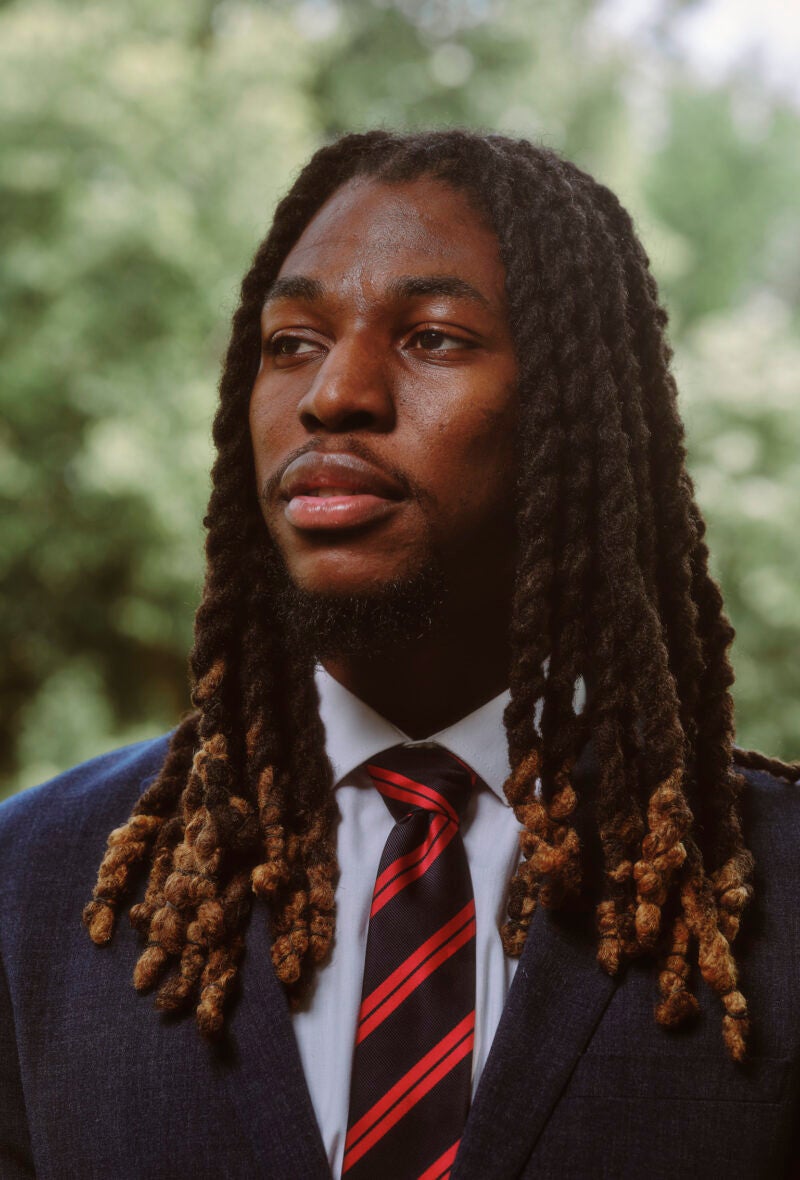Not everyone can say they are working at their dream job. Demarquin Johnson can.
As the legislative director for Ayanna Pressley, the U.S. representative for Massachusetts’ 7th congressional district, Johnson oversees the congresswoman’s entire legislative portfolio, including top priorities like immigration, criminal justice reform, and voting rights. It’s a role, he says, that melds his lifelong interest in the intersection of race, law, and democracy, with opportunities for bold policymaking — and for changing lives.
“I really do feel as if the work that we’re doing right now is making what was impossible, possible,” he says of Pressley and her team.
First as an undergraduate at Howard University, and then as a dual Harvard Law School and Harvard Kennedy School student, Johnson explored the connections between politics and the law, drawn especially to the legacy of civil rights work, particularly for marginalized communities. During his Semester in Washington in early 2020, Johnson spent several months as a fellow with the Democratic Caucus office, writing briefings, compiling research, and helping members of the caucus in their daily work. He found the energy there electric — and irresistible.
At the same time, the coronavirus pandemic had arrived, and so had the protests for racial justice following the police killings of George Floyd and Breonna Taylor. With these momentous events in mind, and an upcoming presidential election in view, “I knew I had to get to work,” Johnson says.
And when he spotted a job posting to join Pressley’s team, the stars seemed to align. “The people I work with are amazing; my boss is an incredible person,” he says. “And I get to work on things that are important to me. I get to help make everyone feel that they are included, that they are respected and valued.”
Although he was initially hired as a legislative assistant, Johnson was quickly promoted to policy counsel, and then to his present role as Pressley’s legislative director. Today, he oversees a team of legislative aides, in addition to writing speeches, helping prepare Pressley for hearings and votes, and managing the congresswoman’s judiciary portfolio.
He also works on priorities such as addressing gun violence, mass incarceration, and discrimination, always looking for ways that effective local solutions can be scaled up. “We’re trying to nationalize good work, making sure that people are treated fairly,” he says, “whether it be at work, on the street, in banking and finance, and beyond.”
“I hope that what we are doing is helping folks see themselves included and represented in their own government.”
For Johnson, confronting systemic obstacles is less daunting than invigorating, when he can see the impact his team is having on people’s lives. What can feel challenging are the constituents he can’t immediately help. “Sometimes we get a letter, a tweet, an email, from a person talking about the pain that they feel. We often know what they really need, but the slow legislative process means we aren’t always able to give it to them right now. And that can hurt.”
But Johnson says those challenges also fuel his motivation to continue to work to break down the barriers Pressley’s constituents — and many other people — face, such as racism, homophobia, transphobia, and ableism. Recently, with Johnson as legislative director, the congresswoman introduced bills intended to reduce the racial wealth gap, advance transgender rights, and protect reproductive rights.
It’s what he’s been fighting for his entire life. “I hope that what we are doing is helping folks see themselves included and represented in their own government,” he says. “And that’s what inclusion is about. That’s what diversity is about. That’s what democracy should be about.”
Working for the People
Fifteen years ago, Harvard Law School launched its Semester in Washington Clinic, an externship program focused on training government lawyers. Meet three other former participants who are dedicating their careers to government service
